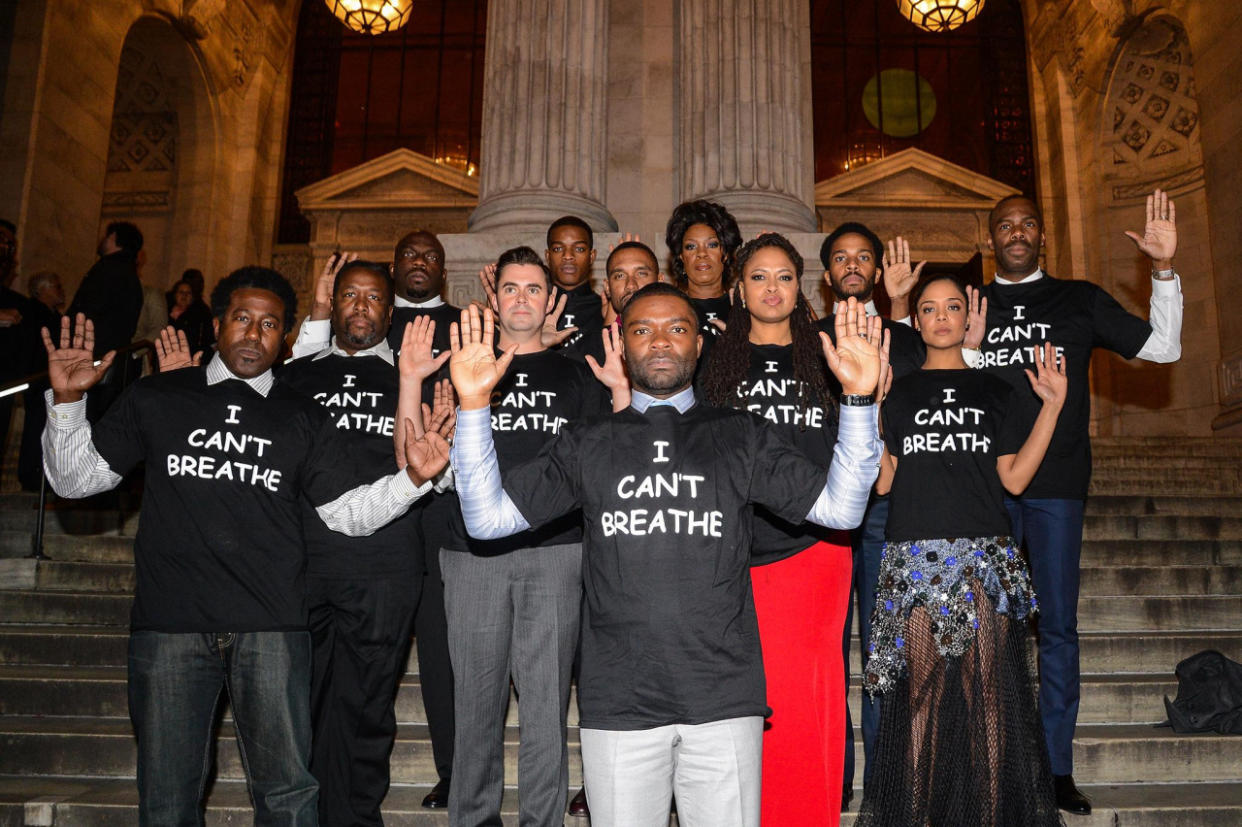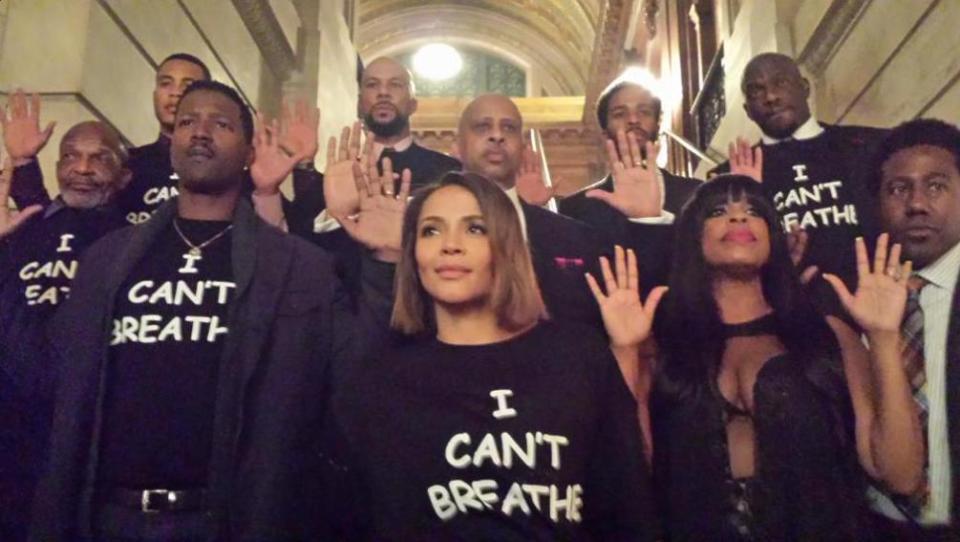'Selma' Cast Talks About Their New York Premiere Protest

Cast and crew from the movie Selma in New York last night
The cast and crew of Selma were in New York last night for the premiere of their moving drama, which chronicles the mid-’60s voting-rights efforts of Martin Luther King Jr. The Selma team members weren’t just there to show a movie, though: They also showed solidarity with activists who are marching in cities across the country to protest police brutality and racial inequality.
Director Ava DuVernay, star David Oyelowo (who plays Martin Luther King, Jr.), Tessa Thompson, Lorraine Toussaint, Wendell Pierce and several other castmates wore “I Can’t Breathe” T-shirts and posed with their hands up while standing on the steps of the New York Public Library in Manhattan. The gesture was a reference to the nationwide protests against the deaths of Eric Garner and Michael Brown, two unarmedblack men who were killed at the hands of police officers (in both cases, a grand jury refused to indict the officers involved).
Related: Watch Martin Luther King Jr.’s Struggle for Justice in the Exclusive First ‘Selma’ Trailer
“It’s just such a weird thing to be on red carpets and to be doing things surrounding this movie, Thompson told Yahoo Movies before the premiere. The actress — who plays activist Diane Nash in the film — noted that she’d have felt odd participating in the premiere without helping to bring more attention to the protestors on the street.
"I can’t speak for the rest of the cast, but working on the movie was alternately this thing of feeling very dwarfed in some ways, by history and by what people have done in history,” she explained. “Ultimately, I was empowered by the knowledge of knowing that [the Selma protestors] were just people that decided to do something, and basically threw things at a wall to see what stuck. All they had really was their fortitude and conviction, but not more than that — at least at the beginning. So [there’s this] feeling of, ‘Okay so what do we do about that?’”
The answer came, in part, from the growing number of entertainers and pro athletes who have protested the controversial court decisions in very public arenas.
"I recently saw a photograph of Dave Chapelle on a red carpet and he had his arms up, and I felt that when people start making news like that in that space, it becomes kind of a call of action and a dare to everyone else who happens to have a similar platform,” Thompson said. “So we started to have conversations about that, and said, ‘So what do we do? We’ll stage a photograph.’ And I think we’ll at least begin a bigger, broader conversation about what do we do.”

Another social media shot from Sunday night
In an interview the day before the premiere, DuVernay — who recently became the first African-American woman to be nominated for a Best Director Golden Globe — reflected on the close timing of the Millions March event and the opening of Selma.
"Is that not incredible that we’re sitting here, talking about this film, and there are marches going on around the country right now about the same issues? It’s stunning,” she marveled. “I think it really just shows that we’re on a continuum. This thing continues to happen. There’s something that we do in this country where we just gloss over this stuff. We react to it, and then we’re on to the next. And it’s just about time that we actually stop and dig into it.”
Common, the actor-rapper who plays Rev. James Bevel, said the tragic deaths of Brown and Garner need not be in vain.
“We’ve got to use their loss and the things that happened to them to be something that help us move forward as a country and as a world, so we don’t have any more people’s lives being lost in that type of way,” he said. “It’s inspiring that people are out protesting, and I think it’s a testament that Selma is coming out right now.”
Unlike the 1960s civil rights movement, which had King and Malcolm X and several other historic figures at its center, the new marches have been powered in large part by social media, with less reliance on a single, unifying leader and orator. DuVernay says she’s actually encouraged by such a people-led movement, though the absence of Dr. King, especially in light of Selma and its constant reminder of his victories, is very bittersweet.
"I think King would be out there with people right now,” she said. “I kind of get a little emotional [thinking about it]. I imagine him as an old man out there with his hat and his coat, marching with people. I believe he’d be right out there, because he was a man of the people, and it’s just tragic that he’s not here to see this thing.”
See the trailer for Selma below:
Photo credit: Getty Images; Jada Yuan/Twitter